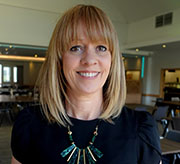5 tips for making your event more sustainable
Pull through page title
Pull through abstract and format in bold and large font
Sustainable events are not only good for the environment, but they're also becoming a necessity for organisations who want to be successful with attendees and sponsors alike.
Here’s a few tips on how to make your next event sustainable and eco-friendly:
1. Prioritise eco-friendly venues
If you’re looking to create a sustainable event, the most important thing you will need to consider is the venue.
Make sure that you look for an eco-friendly venue that has a commitment to sustainability. Venues with a commitment to sustainability will use practices that help to minimise unnecessary consumption use and will help to make your event as sustainable as possible.
This can include using renewable energy sources, implementing water conservation measures, having energy-efficient features and electric car charging points. All of this will help lower your event’s greenhouse gas emissions and create a smaller environmental footprint overall.
Eco-friendly venues also will often use advanced waste management systems. They might have facilities for composting food scraps, recycling different materials, and minimising single-use items. Ultimately helping reduce the amount of waste your event generates, keeping landfills and the environment cleaner.
2. Prevent unnecessary waste
Waste is an unfortunate inevitability when bringing people together for events, in fact, the events industry as a whole wastes up to 10% of everything it produces, with the typical attendee producing 1.89kg per day.
This means that in order for your event to be as sustainable as possible, you need to take measures to reduce your waste output wherever you can.
One of the easiest ways to reduce waste is by making the most out of online and digital tools to eradicate unnecessary paper wastage. Instead of printing masses of event invitations, programmes and handouts, send them out via email instead. Alternatively, you could use an app or a QR code to share information with your attendees seamlessly and in real time.
Another way to reduce waste at your event is by going plastic-free. This means avoiding single-use plastic cups, plates, utensils, and water bottles. Instead provide reusable alternatives or compostable options.
Also, carefully consider the materials that you use for your event’s decorations and giveaways. Are the decorations you’ve chosen going to be used again? Do your giveaways contain items that are going to be kept long after the event has finished? If your answer is no, then steer clear and instead opt for natural decorations such as plants and use digital gifts or recycled materials for your giveaways.
3. Provide sustainable catering options
Catering is rarely the first thing that enters people’s mind when thinking about sustainability, but the environmental impact that it has is undeniable. Research has shown that the food and drink emissions from a 100-person event are equivalent to driving up to 2,929 miles in a petrol-powered car or charging 140,000 smartphones to full battery.
To ensure that you are doing the best you can for your event to be sustainable, work with caterers or venues who focus on local, seasonal ingredients. Using seasonal ingredients is important as it helps to reduce the emissions used for the transportation of food, minimises the use of artificial resources used to help crops grow, and helps to support local agriculture.
4. Encourage eco-friendly transport
In a bid to cut down on the emissions generated by your event, encourage your attendees to consider their method of transportation to your event.
As part of your pre-event communications, perhaps suggest to your attendees that they carshare or cycle to your event be more eco-friendly. Doing so may inspire your attendees to take action when it may have not previously crossed their mind. Furthermore, consider picking a venue that is easily accessible through public transportation and offers electric car charging points for maximum green efficiency.
5. Promote sustainable practices to your attendees
When hosting an event, you have the rare opportunity to use your platform to encourage attendees to implement sustainable practices while also using it as an avenue to promote your own organisation’s sustainability efforts. Doing so will hopefully encourage your delegates and other attending organisations to do the same in the future while also helping your organisation be perceived as an ethical brand by your attendees, helping you to differentiate yourself from competitors and perhaps even generate new business in the future.
After your event, try measuring the environmental impact of your sustainability efforts and share the results with your attendees, sponsors, and stakeholders. Calculate metrics such as carbon emissions avoided, waste diverted from landfills, and water saved. You can then celebrate your achievements and use them to inspire future events and industry peers to prioritise sustainability.
Sustainable Events at Warwick Conferences
At Warwick Conferences, we truly recognise the importance of sustainable events, and this is reflected at the heart of everything we do.
We pride ourselves on our efforts in sustainability, and as a result we’ve been given the Platinum Award from Greengage ECOsmart and a Green Star certification from the IACC for our green initiatives involving waste management, recycling, energy, water conservation and more.
If you’d like to learn more about how we can help you host sustainable events, please get in touch with us at hello-conferences@warwick.ac.uk, or call us on +44 (0)24 7652 3222 for an informal conversation.
 Justine Meek
Justine Meek
Agency Relationships Manager at Warwick Conferences and Director of Agent Relations at The Meeting Industry Association. Justine has over 30 years within the meetings and events industry, with 13 of these at Warwick Conferences. She manages the third-party agents for the business, forming great relationships and offering solutions for their client’s needs.
J dot K dot Meek at warwick dot ac dot uk

